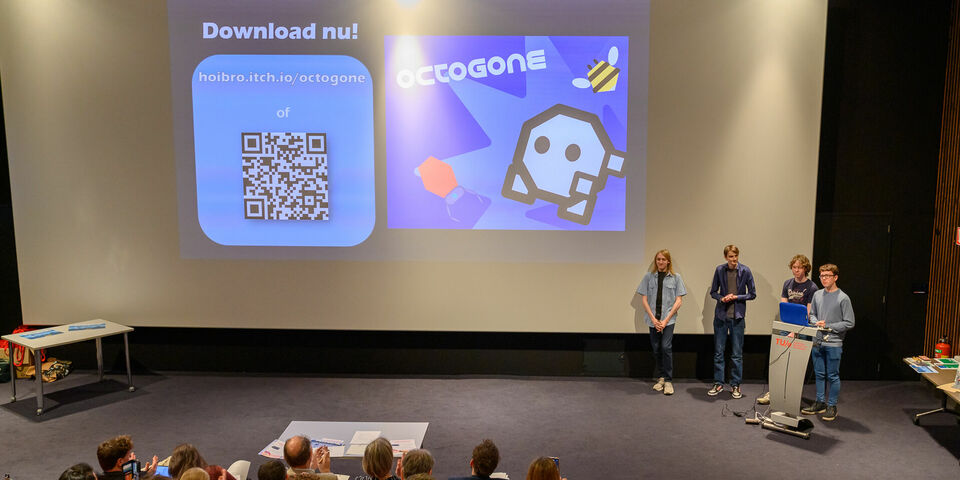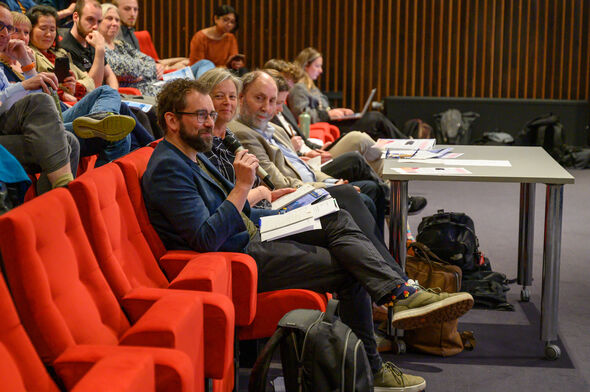Best Meesterproef students battle it out at TU/e
Groups of students from five different high schools presented their exam assignments to a jury of TU/e community members and a sizeable audience at De Zwarte Doos this Thursday. The battle for the best Meesterproef is one of the activities Pre-TU/e organizes throughout the year to get high school students excited about technology and give them a realistic idea of what to expect at university.
A video game, a robotic arm system to retrieve items from closets, and a tool to install sealing: these are some examples of the final projects that high school students presented during the Meesterproef grand finale at De Zwarte Doos on Thursday. The Meesterproef is a final project for students from Technasium schools in East Brabant. These are high schools where students are taught an extra subject revolving around research and design, which prepares them for pursuing an education in the hard sciences.
Not only does TU/e serve as a backdrop for the Meesterproef grand finale, the university is also involved in the entire project, says Maud Huising of Pre-TU/e. “We provide expert guidance, projects are commissioned by the university community, and the jury at the grand finale consists of full professors, a lecturer and students from TU/e.” This year, student teams InMotion and Totem Game Dev commissioned projects. This means they go through an entire process with the students, including several feedback moments.
Transition to university
Between presentations, the high school students are given a tour of the campus by their counterparts at TU/e. The latter don’t have to act differently on the tour, Huising says. “We encourage them to be honest and say what it’s really like to study at TU/e, without making things sound better than they are or giving a sales pitch. That way high school students know what they’re getting into later.” Pre-TU/e is not there to persuade them to come study here, she emphasizes. It’s just there to make things go more smoothly, to aid the transition between high school and university. “We inform high school students about what they need and give Challenge Based Learning workshops, for example, to introduce them to the kind of education we offer here.”
Activities such as the Meesterproef grand finale give students a good idea of what a campus looks and feels like. “Actually going somewhere to have a look really makes a difference,” says Carlien Schouten, network director at Technasium. According to her, it somewhat lowers the threshold to take the plunge. The activities are also important for the network itself. “We like to see where students end up and what we need to give them to feel like they fit in there,” she says.
Game
When the students return from the tour, it’s time for the award ceremony. The group that developed a game commissioned by student team Totem Game Dev wins the grand finale. Jury member and professor Gerrit Kroesen praises the Eckartcollege students for the content of the project and for producing something concrete at the end of it. He also says the students gave a strong performance in the discussion following the presentation. “Technasium to the fullest,” Kroesen says.
The small group guided by Totem Game Dev was tasked with developing a game with a focus on player engagement, says Maarten Hundscheid, who was in charge of supervising the students on behalf of the student team. “I’m quite impressed with the game they developed. The students used mechanicsthat you don’t see together very often.” Finn de Groot, one of the members of the small group, is pleased with the assignment they received. “Video games are mostly about making money, rather than giving gamers a fun experience. Our game is totally focused on the latter.”
Studying at TU/e
De Groot liked working with the student team. “We generally chose our own path and occasionally got advice. At the beginning we had several versions of our design document, so we could discuss with Maarten what was feasible and what he thought would work well.” Whether the good experience with the student team and the university would have contributed to his decision to study at TU/e will remain forever unclear. The student – like the rest of the small group – had already enrolled at the university. He hopes to pursue a double bachelor’s degree in Applied Physics and Computer Science – if he makes it through the intake restriction. He doesn’t know yet if he’ll join Totem Game Dev. “I’m interested, but I wonder if I’ll have the time.”



Discussion